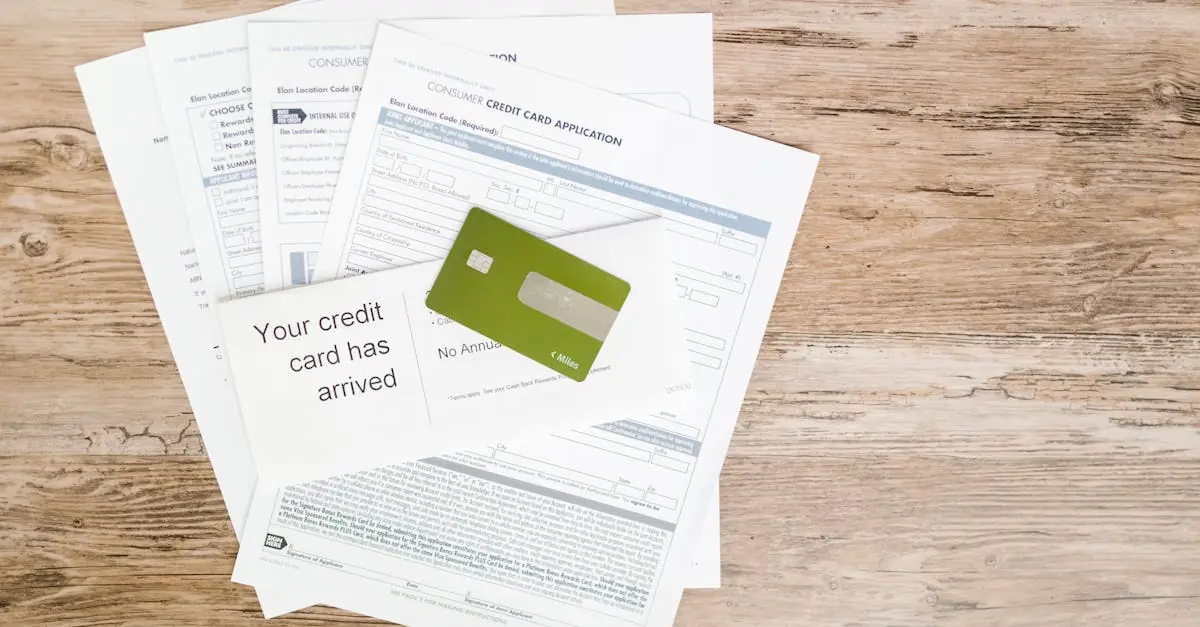Thinking about snagging a Discover Card? You’re not alone. With its enticing rewards and cash-back offers, it’s like the golden ticket of credit cards. But before you dive headfirst into this financial adventure, there’s a little number you need to know: your credit score.
It’s not just a random figure; it’s the key to unlocking a world of financial benefits. While Discover doesn’t require a perfect score, having a solid credit history can make your application smoother than a freshly buttered biscuit. So, let’s break down what score you really need to get that shiny new card in your wallet and why it’s worth the effort. After all, who wouldn’t want to earn rewards while shopping for their favorite snacks?
Table of Contents
ToggleUnderstanding Credit Scores
Understanding credit scores is essential when considering applications for cards like the Discover Card. Credit scores assess the creditworthiness of individuals, influencing approval chances and interest rates.
What Is a Credit Score?
A credit score ranges from 300 to 850, with higher values indicating better creditworthiness. Most lenders follow the FICO score system, which evaluates payment history, credit utilization, length of credit history, new credit accounts, and credit mix. Each of these elements plays a significant role in shaping the overall score. Consumers with scores above 700 typically enjoy favorable credit terms. Maintaining a good score can lead to lower interest rates on loans and better credit card offers.
Factors Affecting Your Credit Score
Multiple factors influence credit scores, starting with payment history, which accounts for 35% of the score. Next, credit utilization impacts 30% of the score, reflecting how much credit is used versus total credit limits. The length of credit history represents 15%, as older accounts establish reliability. Moreover, new credit inquiries contribute 10%, showing how many recent credit applications have occurred. Finally, credit mix holds 10% of the score, indicating a blend of different types of credit accounts, such as revolving and installment loans. Regularly monitoring these factors can lead to improved scores over time.
Credit Score Needed for a Discover Card
Understanding the credit score needed for a Discover Card is essential for applicants. A solid credit score can significantly influence approval chances.
General Requirements
Typically, a credit score of at least 700 is recommended for favorable terms on a Discover Card. Individuals with scores in the mid-600s may qualify for some options, though terms might be less attractive. Factors like payment history and credit utilization play vital roles in this evaluation. Achieving a score above 700 increases the likelihood of receiving cash-back rewards and lower interest rates.
Specific Discover Card Options
Various Discover Card types cater to different credit profiles. The Discover it Secured Card is available for those with limited or poor credit histories. A score of 580 or higher often suffices for this option. The Discover it Cash Back and Discover it Miles cards target those with better credit, typically requiring scores over 700. Each card presents unique benefits, making it crucial to assess options based on personal credit standings.
How to Improve Your Credit Score
Improving a credit score is crucial for securing favorable terms on a Discover Card. Implementing effective strategies can significantly enhance creditworthiness.
Tips for Boosting Your Score
- Pay bills on time: Timely payments account for 35% of the FICO score, making punctuality vital.
- Reduce credit utilization: Keeping utilization below 30% shows responsible credit management.
- Monitor credit reports: Regularly checking reports can help identify errors affecting the score.
- Limit new credit inquiries: Each new application can temporarily lower the score, so applying sparingly is wise.
- Establish a diverse credit mix: Different types of credit, like installment loans and revolving accounts, can enhance the score.
Common Mistakes to Avoid
- Missing payments: Late payments can negatively impact the score, so setting reminders ensures timely payments.
- Maxing out credit cards: High balances can increase utilization rates, jeopardizing credit standing.
- Closing old accounts: Longer credit histories contribute positively, so keeping old accounts open is beneficial.
- Ignoring statements: Not monitoring accounts may lead to unexpected overspending and missed payments.
- Failing to dispute inaccuracies: Not addressing incorrect information in credit reports can hinder improvement efforts.
Benefits of Having a Discover Card
The Discover Card offers numerous advantages for cardholders. These benefits enhance customer satisfaction and financial well-being.
Rewards and Cashback Offers
Discover Card provides competitive rewards and cashback options. It often features 5% cashback on rotating categories like groceries, gas, and restaurants, allowing users to maximize their savings. Additionally, cardholders earn 1% cashback on all other purchases, ensuring they receive rewards on every dollar spent. Discover also has unique promotions, such as doubling cashback for the first year, adding significant value to new cardholders. These attractive rewards make the card appealing for everyday spending.
Financial Flexibility
Flexibility in payments is another key benefit of owning a Discover Card. Cardholders can choose their payment due dates, accommodating diverse financial situations. The card supports balance transfers, enabling users to manage existing debts efficiently. Furthermore, Discover offers a generous grace period for payments, helping avoid interest charges when balances are paid on time. This combination of features helps individuals maintain better control over their finances, making the Discover Card a smart choice for budgeting and spending.
Understanding the credit score needed for a Discover Card is vital for potential applicants. With a score of at least 700 generally recommended for the best terms, individuals should assess their credit standings before applying. Those with scores in the mid-600s may still find options available, though the terms might not be as favorable.
Improving one’s credit score through timely payments and responsible credit utilization can enhance approval chances. The Discover Card offers a range of benefits that cater to various credit profiles, making it a worthwhile option for many. By taking proactive steps to manage credit health, individuals can unlock the rewards and flexibility that come with this popular card.



